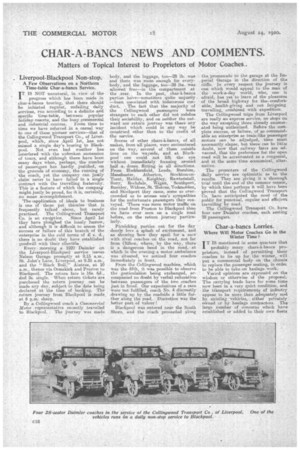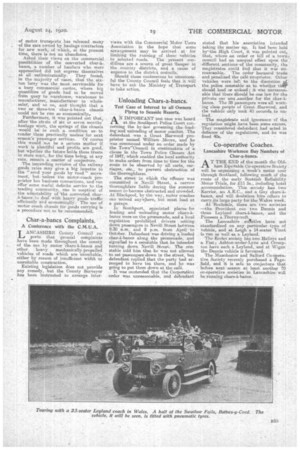CHAR-A-BANCS NEWS AND COMMENTS.
Page 18

Page 19

If you've noticed an error in this article please click here to report it so we can fix it.
Matters of Topical Interest to Proprietors of Motor Coaches..
. Liverpool-Blackpool Non-stop.
A Few Observations on a Northern Time-table Char-a-bancs Service.
IT IS NOT unnatural, in view of the
progress which has been made in char-a-balms touring, that there slould be initiated regular, unfailing daily services, run according to a definite and specific time-table, between popular holiday--resorts, and the busy toommeroial and industrial -centres. From time to time we have referred in a casual way to one of these pioneer services—that of the Oallingwood Transport Co., of Liverpool, which, since April 1st, has not missed a single day's touring to Blackpool. Not even bad weather has interfered with -the unbroken succession of tours, and although there have been many days when, perhaps, the number of passengers has hardly justified, on the grOunds of economy, the running of the coach, yet the company can. justly claim never to have failed in a single contract with the travelling fraternity. This is a feature of which the company might justly be proud, for it is, certainly, no mean accomplishment.
-The vapplication of ideals to business is one of those pet theories that is frequently talked about, but rarely practised. The Collingwood. Transport Co. is an exception. Since April 1st they have plough. ed the lonely furrow, and although it is difficult to assess the success or failure of this branch of the enterprise in the cold terms of 2 e. cl. there is no doubt they have established goodwill with their clientele Every morning a 1920 Daimler on. the Liverpool-Blackpool service leaves Nelson Garage promptly at 9,15 am., St. John's Lane, Liverpool, at 9.35 a.m., and the "Black Bull," Aintree, at 10 a.m., thence via. Orniskirk and Preston to Blackpool. The return fare is 16s. 6d., dad 9s. single. When return tickets are purchased the return journey ran be made any day, subject to the date being declared at the time of booking. The return journey front Blackpool is made at 6 p.m. sharp.
By a Collingwood coach a Commercial Motor representative recently travelled to Blackpool. The journey was made body, and the luggage, too-28 lb. was and there was room enough for everybody, and the luggage, too-28 lbss. was allowed free—in the compartment at the , rear. In the past, char-A-banes parties. have—sometimes quite unjustly . —been associated with indecorous conduct. The fact that the majority of the Colling-wood passengers were strangers to each other did not subdue their sociability, and on neither the outward nor return journey was there any incident which could in any way be construed other than to the credit of the service.
Scores of other chars-a-bancs, of all makes, from all places, were enebuntered on the way, several of them outside in-ns on the wayside, and at Blackpool • one could not lift the eye without. immediately focusing around half ,a, dozen flitting in all direCtions. FT0111 Hucldeisfield, Leeds, Minim, Manchester, Atherton, Stockton-onTrent, Halifax, Keighley, Rawtertstall, Bury; Rochdale, Wigan, ' Southport, Burnley Widnes, St. 'Helens, Todanorclen, and Stockport they came, some so overcrowded as to arouse one's sympathies for the unfortunate passengers they conveyed. 'There was more motor traffic on the road from Preston to Blackpool than we have ever seen an a single road before, on the return journey particularly.
Picnicking parties out for the day dearly love a splash of excitement, and as showing how they spoil for a race with rival coaches on the road, not. far from Clifton, where, by the way, there is a dangerous bend in the road,. at which in the evening a motor ambulance was situated, we noticed four coaches immediately in front, From the Collingwood machine, which was the fifth, it was possible to observe the gesticulation being exchanged, ac.companied no doubt by verbal reiteration between passengers of the two coaches just in front. Our expectations of a race -were not fulfilled, coach No. 4 discreetly .drawing up by the roadside a little further along the road. Discretion was the better part of valour !
Blackpool was entered near the South Share, and the coach proceeded along
• the -promenade. to the garage at the Int. . penal Garage in the direction of the cliffs. In every respect the journey is one which would appeal to the man -of the work-a-clay world, who, one is afraid, has yet to learn of the pleasures of the broad highway for the..conifortable, health-giving and not fatiguing travelling, combined with expedition.
The Collingwood trips from Liverpool are really an express service, no stops on the way excepting those already enumerated being authorized. Before the coin. pieta success, or failure, of so commendable an entenprise as train-like passenger motors can be a,djud„eed, time must-, necessarily elapse, but there can be lit-tie doubt, now that railway fares are advanced, that the preference for. the open road will be accentuated as a congenial, and at the same time economical, alternative.
The promoters of the Collingwood daily service are optimistic as to the results. They are giving it a thorough trial until the end of the summer season, by which time perhaps it will have been proved that the Collingwood Transport Co. have anticipated the need of the public for punctual, regular and efficient travelling by road,
.
The Collingwood Transport Co. have four new Daimler coaches, each seating
28 passengers. • •
Char-a-bancs Lorries.
Where Will Motor Coaches Go in the Winter Time ?
T T IS mentioned in some quarters that I probably many chars-à-banes proprietors, instead of permitting their coaches to lie up for the winter, will put a commercial body on the chassis to replace the passenger seating, in ordei to be able to talce.on haulage work.
Varied opinions are expressed on the wisdom or otherwise of the proposal. The carrying trade have for some time now been in a very quiet condition, and the transport requirements' of induStry appear to be more than adequately met; by existing vehicles, either privately owned or by haulage contractors. The large number of concerna which have established or added to their own fleets
of motor transports has released many of the cars owned by haulage contractors for new work, of which, at the present time, there is not an abundance.
Asked their views on the commercial possibilities of the converted char-a,banes, a. number of hauliers who were approached did not express themselves
at all enthusiastivally. They found, in the majority of cases, that the sixton lorry was the most serviceable for a busycommercial centre, where big quantities of goods had to be moved from quay to warehouse, warehouse to manufacturer., manufacturer to wholesale, and so on, and thought that a two or three-ton char-a-bancs chassis could not be run so economically.
Furthermore, it was pointed out that, after the strain of six or seven months' haulage work, the springs of the chassis would be in such a condition asto render them practically useless for next season's passenger services. Of course this would net be a serious matter if work is plentiful and profits_ are good, but wbether t•he future holds these treats in store rtimt, for the time being, at any rate, remain a matter of conjecture. The impending revision of the railway goods rates may give a big impetus to the "send your goods by road ' movement, hut unless the motor-coach Proprietor has business connections. and can offer some useful definite service to the trading community, one is sceptical of the adaptability of the converted charaelaancs to deal with heavy goods traffic efficiently and economically. The use of motor coach chassis for goods carrying is a procedure not to be recommended.
Char-a-bancs Complaints.
A Conference with the C.M.U.A. LANCASHIRE County Council reports that general complaints have been made throughout the county of the use by motor chars-a-basics and other. heavy meehanically.-propelled vehicles of roads which are unsuitable, either by reason of insufficient width or unsuitable construction.
Existing legislation does not provide any remedy, but the County Surveyor has been instructed to arrange inter
views with the Commercial Motor Users Association in the hope that some arrangement May be. arrived . at for limiting the running of these vehicles
to selected roads. The present conditions are a source of great 'danger in the country districts, and a cause of expense to the district councils..
Should these conferences be unsuccessful the County Council feels that it will have to ask the Ministry ofTransport to take action. _
Unloading Chars-a-bancs.
Test Case of Interest to all Owners Plying to Seaside Resorts.
AN IMPORTANT test case was heard at.the Southport Polio° Court concerning the by-law governing the -load and unloading of motor coaches. The defendant was a Great Harwoodproprietor named William Moore, and he wassummoned under an order made by the Towir-Couneil in continuation of a, clause in the Town Police Clauses Act of 1847; whichenabled the local authority to make orders from time to time for the route to be observed by all carts, carriages, etc., to prevent obstruetien of the thoroughfares.
The street in which the offence was . committed is Nevill Street, a. narrow thoroughfare liable during the summer season to become obstructed and crowded. At Blackpool, by the way; motor coaches can unload anywhere, but must load at a garage.
In Southport, appointed places for loading and unloading motor chars-abanes were on the eromenade, and a.local regulation prohibited drivers setting down passengers in Nevill Street between 9.30 a.m. and 9 p.m. from April to ' October, Defendant was driving a. loaded char-a-banos along the promenade, and signalled to a constable that he intended turning down Nevill Street.. The constable told him that he was not. allowed to set passengers down in the street, but defendant re-plied that the party had arranged to have tea there, and he was going to put them down at the café.
It was contended that the Corporation order was unreasonable, and defendant
stated that his association. intended taking the matter up. It had been held by the High Court, it was pointed out, that, where an order or bill of a town, council had an unequal effect upon the different sections, of the community, the magistrates could find that it was unreasoua,ble. The order harassed •trade and penalized the café proprietor. Other vehicles were left to the discretion At the pollee constable as to whether thrf should load or unload; it was unreasonable that there iliould be one law for the private car ano ,another for the char-abanes. The 28 passengers were all working class people of Great Harwood, and the vehicle only took 40 seconds to unload.
The magistrate said ignorance of the regulation might have been scene excuse. They considered defendant had acted in defiance of the regulations, and he was fined 405.
Co-operative Coaches.
Lancashire Workmen Buy Numbers of Char-a-bancs.
AT THE END of the month the Old. hdm Equitable Co-operative Society will_ be organizing a week's motor tour through Scotland, following muoh. of the route of the early Scottish Reliability Motor Trials, for £11 5s., including hotel accommodation. This society has two 'Carrier, an A.E.C., and a Guy chars-abanes, and will doubtless hire others to carry its large party forthe-Wakes week.
At Rochdale, there are two societies —the Provident run two Dennis and three Leyland &are-a-banes, and the Pioneers a Thornycroft. The Lancashire socileties have not Standardized on any particular •type of vehicle, and at Leigh a 14-seater Vinot as run as well as a Leyland.
The Ecoles society has two Halleys and a Fiat; Aeliton-under-Lyne and .Grompton have each a Leyland,_ and at Wigan the Dennis vehicle is favoured.
The Manchester and Salford Co-opera tive Society recently purchased a agefield, and it is safe to conjecture that before next season at, least another 70 co-operative societies in Lancashirewill be running chars-a-banes;




























